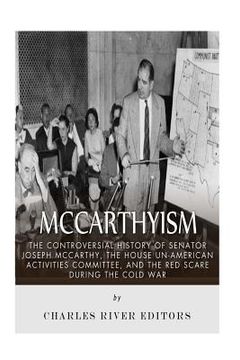McCarthyism: The Controversial History of Senator Joseph McCarthy, the House Un-American Activities Committee, and the Red Scare Du (en Inglés)
Reseña del libro "McCarthyism: The Controversial History of Senator Joseph McCarthy, the House Un-American Activities Committee, and the Red Scare Du (en Inglés)"
*Includes pictures *Profiles the Alger Hiss case *Includes testimony from HUAC hearings and McCarthy's hearings *Includes quotes from McCarthy about his career *Includes online resources and a bibliography for further reading *Includes a table of contents In 1947, at the start of the Cold War, President Truman tried to assure Americans who were worried about Communists in government that he was "not worried about the Communist Party taking over the Government of the United States, but I am against a person, whose loyalty is not to the Government of the United States, holding a Government job. They are entirely different things. I am not worried about this country ever going Communist. We have too much sense for that." Nonetheless, shortly after World War II, Congress' House Committee on Un-American Activities (HUAC) began investigating Americans across the country for suspected ties to Communism. The most famous victims of these witch hunts were Hollywood actors, such as Charlie Chaplin, whose "Un-American activity" was being neutral at the beginning of World War II, but at the beginning of the Cold War, many Americans had the Red Scare. Among the people called before HUAC, perhaps none are as controversial as Alger Hiss. Hiss had graduated from Harvard Law, after which he worked as a clerk for Supreme Court Justice Oliver Wendell Holmes, worked in the Roosevelt administration for the Agricultural Adjustment Association, and was Head of the Carnegie Endowment for International Peace. That background didn't exactly sound like one held by a Soviet spy, let alone a Communist, but Elizabeth Bentley, a former Communist, notified the Committee about a suspected spy ring and named several names, including Hiss. More notably, Hiss was also accused of being a Communist and Soviet spy by an admitted Communist, Whittaker Chambers. HUAC was well in decline by the time the '60s dawned, a fact so obvious that HUAC actually tried to restore its reputation by changing its name to the Internal Security Committee in 1969. Nevertheless, a few years later, the committee's authority was rolled into the House Judiciary Committee's, bringing to an end one of Congress' most controversial chapters. Another factor was the disrepute the Red Scare fell into because of the antics of Wisconsin Senator Joseph McCarthy. McCarthy had made waves in 1950 by telling the Republican Women's Club in Wheeling, West Virginia that he had a list of dozens of known Communists working in the State Department. The political theater helped Senator McCarthy become the most prominent anti-Communist crusader in the government, and the Rosenberg case only further emboldened him. McCarthy continued to claim he held evidence suggesting Communist infiltration throughout the government, but anytime he was pressed to produce his evidence, McCarthy would not name names. Instead, he'd accuse those who questioned his evidence of being Communists themselves. McCarthy's rise made it possible for him to continue lobbing accusations against people, but the Senator finally met his match when he went after the Army. As chairman of the Senate Committee on Government Operations, McCarthy summoned decorated World War II veterans and challenged their loyalty, and when he openly suggested World War II hero Brigadier General Ralph W. Zwicker was a Communist during one hearing, the military had enough. In April 1954, the committee hearings were widely televised, and Americans watched Army members demand that McCarthy name names and provide evidence. The Army's legal representative, Joseph Nye Welch, repeatedly demanded that McCarthy produce the list of alleged Communists in the U.S. Army and railed at the Senator: "You've done enough. Have you no sense of decency, sir? At long last, have you left no sense of decency?" McCarthy was publicly and permanently repudiated. He would be censured by Congress, and he would die just a few years later.

